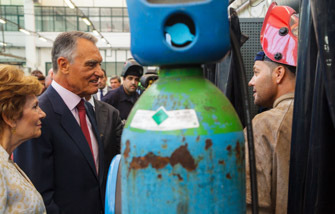
When paying a tribute to the figure of Marshal António de Spínola, the Lisbon City Council is practicing an act of great justice for which we must all evidence great joy.
António de Spínola was a distinct Cavalry officer who was awarded the highest decorations. He was notable in combat and left a deep mark in the memory of those who served under his command. All of us recognize the greatness of his character, his enormous love for the Fatherland, his intense sense of duty, his spirit of loyal camaraderie and the endeavour he always placed in the defence of his men. Above all, he was a patriot and a man of great courage.
It was this courage that led him, during his whole life, to always say what he thought, whatever the consequences. Even knowing that he could be penalized, he did not hesitate in publishing a book that would make History and, what is more, did make History. As a Portuguese, he worried for the future of Portugal. And, for this reason, he wrote Portugal and the Future. He could not adjust to the status the Country had reached. He wanted a different Portugal and did not hesitate in saying so in the pages of a book that stamped an era and contributed to the fall of the regime.
António de Spínola would become the first President of the Republic of a Portugal renewed on 25 April 1974. He would later say, almost at the end of his life, that the «main objective of the Revolution had been achieved», with the «return to the Portuguese of an inestimable asset without which life has no significance – freedom». He headed the State with great dignity in a very difficult period. He was President of the Republic with the same courage that, many years previously, he volunteered to go to Africa. He fought for a truly democratic Portugal and for the building of a State comprising the Rule of Law based upon the dignity of the human being. He was totally loyal to the people of Portugal, as he had always been loyal to the men who served under his orders.
Such as all great individualities, António Sebastião Ribeiro de Spínola was a controversial figure, who attracted passion. His charisma left nobody indifferent. Portugal awarded him the highest decorations. But I am not certain that we have always measured up to the standards of life which he bequeathed us.
The tribute we are today paying to his memory is, without doubt, an act of justice. But, much farther than tributes paid by men, time shall be the judge who will take care to reserve him the place in History that he deserves. His place in History is that of a Portuguese who loved the Portugal where he was born, a Cavalry officer who dignified his Arm, a President of the Republic that led the Country at a time of great hopes, but also of grievous crises.
The memory of Marshal António de Spínola will always be party to those who accompanied him, in good and bad times. On this day the city of Lisbon renders him a deserved tribute, showing that the passing of years and the restraining of passions are the best way to impartially judge the biography of great men.
© 2006-2016 Presidency of the Portuguese Republic
You have gained access to the records of the Official Site of the Presidency of the Republic from 9 March 2006 to 9 March 2016.
The contents available here were entered in the site during the 10 year period covering the two mandates of President of the Republic Aníbal Cavaco Silva.